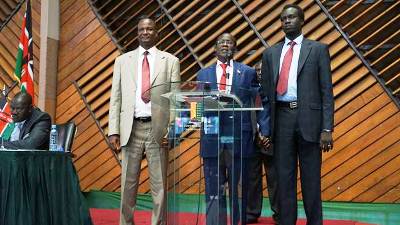S. Sudan VP calls for peace and reconciliation
May 15, 2016 (JUBA) – South Sudan’s vice president, James Wani Igga has advised the country’s citizens to talk peace and reconciliation in order to allow the country develop.

Igga, who serves in the new transitional unity government, did acknowledge there are some unresolved issues related to the peace deal.
“I promise we will equally resolve those matters amicably. This is the only choice for us to relieve our people from the undeserved suffering associated with the armed conflict imposed upon them,” remarked the vice-president.
He added, “I believe this is the only way to return South Sudan to the path of peace, stability and prosperity”.
The vice-president was accompanied to Kenya by Taban Deng Gai, the new minister of energy and Akol Paul Kordit, the deputy minister of information and communication.
As the country’s leaders work in a unity government, among its first challenges, analysts say, will be to overcome mistrust between them. Besides, there are other rebel groups which did not sign the peace deal and this could prove a setback.
Edmund Yakani, an activist, said the new government should make a resolution on the economic situation in the country, especially in terms of revenue control, financial management and administration decisions and practices.
“The TGoNU should immediately start the process of reconciliation, healing and accountability,” he stressed.
Jok Madut Jok, a researcher with the Juba-based Sudd Institute, says the unity government needs to quickly internalise six key issues it must start to be tackled, including security matters, economic challenges, humanitarian crisis, selling the peace agreement to the ordinary population, justice and reconciliation and ensuring that the members of the newly formed government work together for the country’s welfare.
“For a country that has depleted its foreign exchange reserves, lost nearly half of its oil revenues due to the war induced discontinuation of oil production and the decline of global prices, it will be even more crucial that the public finance management systems are strengthened, accountability enforced and sources of revenue diversified,” Jok argued in a policy paper on published in the Sudd Institute’s website.
(ST)
